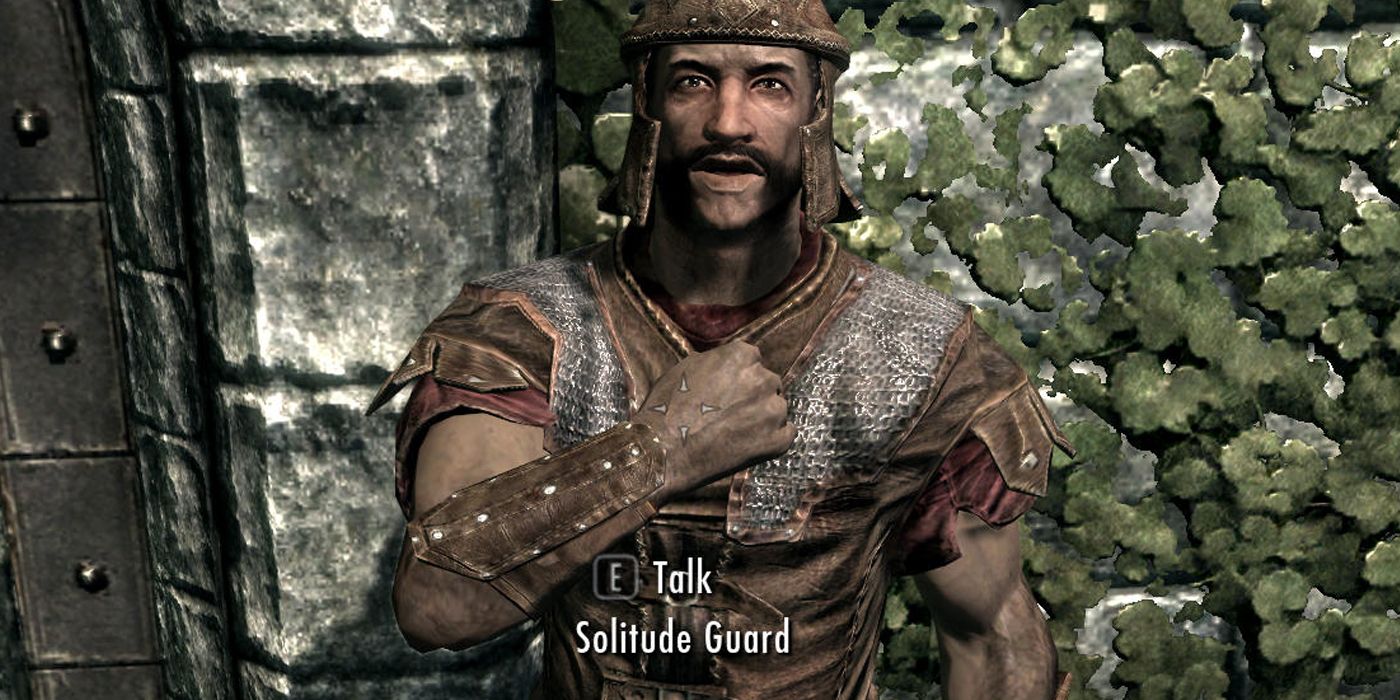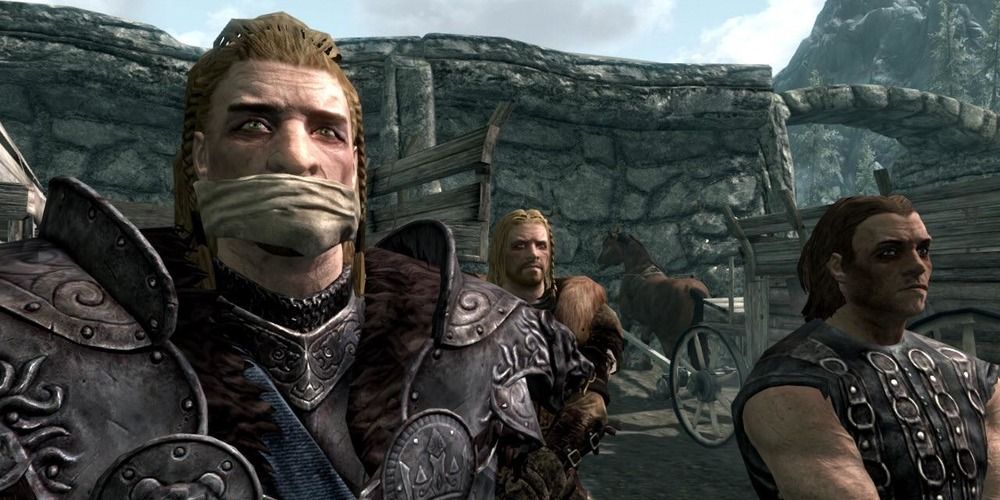Skyrim was my first-ever RPG. I was a plucky young 11-year-old kid with an Xbox 360 who’d never really dipped into the fantasy genre barring The Lord of the Rings, so when I booted it up to see a cat-person, it blew my little mind. I sat by and waited for my brother to finish school just to show him a Khajiit of all things in the character creation menu.
I refused to even start playing because I dug the Dunmer more, but thought that my brother had to see this furry little fuzzball. In hindsight, I probably could’ve found more of their ilk in the game and actually dug in, but that was how excited I was just from the customization options. Those days on the Xbox 360 were a sentimental Shangri-la, but loading screens were long-winded, more so than even Bloodborne on launch. That had a knock-on effect in that a key part of the game’s punishment system – going to prison – actually meant something. It was more tedious to reload than just getting out by sleeping since you’d be jumping through two of those arduous waiting periods. Now, years later, with new hardware, better tech, and next-generation consoles, they’re utterly obsolete.
They were always a little mundane, a prime example of a squashed opportunity, but the idea was so intriguing. You mess up, and you’re hauled off to the local city’s cellar. It wasn’t just that NPCs flipped their lid and decided to skewer you with an iron longsword, you could actually fail stealth encounters and be punished and set back. Granted, they’re boring, but even within Skyrim, there’s a perfect example of a prison done well with Markarth’s Cidhna Mine. Getting hauled off there normally just has you slapping an ore vein to get back out, but having an entire quest with deeply written characters attached to expansive lore relating to the region was something I adored. The prison felt like it had a place in the city, whereas the dungeons of Whiterun or Windhelm were just cellars with bog-standard guards and a bedroll. They were empty, devoid of personality, and lacking in content. Cidhna, on the other hand, was rich with intrigue, political strife, and plots of sabotage.
I’m of a mind that quick and player-based saving at any possible opportunity – scum saving as it’s called – is a detriment to RPGs. Being able to undo choices on a whim completely undermines any weight that comes with them. Whereas, if saving was something done at specific stations like the typewriters in Resident Evil or the phonebooths of Yakuza, then you wouldn’t be able to dip out of tough calls so easily. Alternatively, if you died and you respawned somewhere with the world not having been reset, then you’d have to be much more invested and much more meticulous with your decisions. Just look at Dark Souls – one wrong path, one wrong decision, and Solaire of Astora meets a tragic end with a sunlight maggot wrapping its tendrils around his noggin. The emotional power behind that fight would be lost if you could just roll back your save file and do it again.
This isn’t a popular approach whatsoever and even games like Weird West have opted to back out and make it a choice in difficulty. However, it means that fights have more gusto behind them, and stealth elevates from crouching and one-shotting, stripping NPCs naked, and robbing shopkeepers blind (with no risk whatsoever) to a gamble. Are you good enough? Are your stats? If not, there’s that potential of being caught and hauled off to jail. The dungeons are missing that important aspect of finality. Even though The Elder Scrolls Online doesn’t have jail cells, with guards attacking you instead, not being able to scum save makes stealth so much more interesting as blunders cause you to lose all your stolen goods and a bit of durability or cash from paying the bounty – you can’t just rob everyone and time travel if you fail, you have to be committed and cautious. The amount of high-reward loot I’ve lost in a bid of greedy pickpocketing is probably upward of thousands of Septims, but in Skyrim, I’d have gotten rich from trying over and over.
Put it this way: RPGs with stats like Skyrim are all about invisible dice rolls, and how boring would a Dungeons & Dragons campaign be if you rolled your dice, got the value you didn’t want, and everyone just said, “Fuck it, let’s roll again,” and so you throw the dice onto the table again, and again, and again until you do get that number you want. What’s the point? Still, even if saving was altered, Skyrim’s jails are inherently flawed. You get a lockpick automatically and you can easily break out or just lie in the bedroll and it’s over. It’s designed in such a way that it’s so uninteresting and uneventful that of course, you’d rather just go back and not do it at all. Altering the way that saving works isn’t enough to fix the problem. Dungeons are in need of a radical overhaul.
This can be done in a few ways, both with the jails themselves and the aftermath. Firstly, having a lockpick off the bat should be a benefit for thieves and those with an emphasis on stealth, not just everybody. There should be jobs and odd ends you need to do for your sentence to conclude quicker, or even other NPCs you can meet in exercise time to plan jailbreaks. It could be something as small as them distracting the guard so that you can grab the keys. It doesn’t have to be elaborate. Throw in ledgers that you can modify to make it look like your time is up, or even speech options for those who prioritized the skill tree so that you can charisma your way out. The ultimate punishment is a damaged reputation, perhaps even making it so certain quest givers won’t trust you until you work your way back up in society. This could be done through bounties and dragon slaying and main quest progression that gets your name out there as a hero of the people.
Jails can have a huge knock-on effect, rather than being a nuisance with nothing but a prompt to sleep. There’s so much that Bethesda can do – just imagine that if you got caught and hauled off, the Thieves of the Guild would mock you, maybe even making them hesitant to trust you with the bigger jobs, pushing you to have to prove your worth with the smaller gigs on the side from the likes of Vex. As it stands, going to jail and being arrested holds no weight whatsoever. You could break out and slaughter the guards and it’s back to a normal Morndas, the Jarl still patting you on the back for being a ‘good’ citizen and a trusted Thane. Daggerfall teetered on something worthwhile with a basic court that let you plead innocent or guilty, but all that leads to is you being thrown out of the town where guards will attack you as punishment. It was a start, but nothing has really been done since then. Despite always starting The Elder Scrolls games as a prisoner, being one is utterly uninspiring, but it doesn’t have to be that way going forward.
Next: Russell Crowe Is Zeus In Thor: Love And Thunder
- TheGamer Originals
- Skyrim
- PlayStation
- Xbox
- Nintendo Switch
- PC
- Elder Scrolls
- Bethesda
James Troughton is a writer at TheGamer. He’s worked at the Nintendo-based site Switchaboo and newspaper TheCourierOnline and can be found on Twitter @JDTroughton.
Source: Read Full Article


